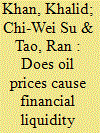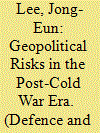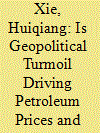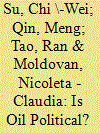|
|
|
Sort Order |
|
|
|
Items / Page
|
|
|
|
|
|
|
| Srl | Item |
| 1 |
ID:
192049


|
|
|
|
|
| Summary/Abstract |
In recent years, geopolitical risk (GPR) has been a crucial factor in investment decisions and stock markets. Therefore, we explore the research on the GPR by employing bibliometric and scientometric analytical techniques. We find 366 scientific contributions in December 2021 from the Scopus database by searching ‘Geopolitical risk’ in abstracts, keywords, and titles. Our findings show that GPR research has gained momentum in the last three years. Specifically, the journal Defence and Peace Economics has one of the highest numbers of research and citation on GPR. Authors in Asia also dominate the GPR literature. Overall, this study contributes to the literature by presenting the existing research that may give new insights for prospective studies in GPR.
|
|
|
|
|
|
|
|
|
|
|
|
|
|
|
|
| 2 |
ID:
162247


|
|
|
|
|
| Summary/Abstract |
Can textual analysis improve statistical prediction of risky geopolitical events? North Korea is the greatest source of geopolitical risk for South Korea due to the former’s unpredictable and secretive military actions against the latter. We find that the tone of English language news articles published by non-South Korean news media, especially U.K. news media, has significant predictive power about North Korean military aggressions. The inclusion of language tone improves the predictive power of the empirical model by as much as 47%.
|
|
|
|
|
|
|
|
|
|
|
|
|
|
|
|
| 3 |
ID:
177828


|
|
|
|
|
| Summary/Abstract |
This study explores the impact of geopolitical events on the stock return behavior of inter-Korean economic cooperation-related firms depending on the North Korean regime. We document empirical evidence showing that cross-sectional stock return tends to react positively to positive geopolitical events under the current regime in North Korea (Kim Jong-un), whereas negative geopolitical events have limited impact. Conversely, we find that negative geopolitical events yielded more pronounced effects on the stock returns of related firms under the former regime (Kim Jong-il). In addition, this study investigates the role of geopolitical shock in the evolution of aggregate economic variables of South Korea using Caldara and Iacoviello’s (2018) geopolitical risk index. Geopolitical shock is found to yield no statistically meaningful impact on stock price index, industrial output, employment, or gross trade volume. Furthermore, aggregate stock market variables are found to be immune to geopolitical shock in South Korea. These results indicate that market participants estimate the escalation of geopolitical risk into full-scale war as unlikely.
|
|
|
|
|
|
|
|
|
|
|
|
|
|
|
|
| 4 |
ID:
178020


|
|
|
|
|
| Summary/Abstract |
This study measures whether oil prices affect financial liquidity (FL) in the Kingdom of Saudi Arabi (KSA). The results indicate a positive association between oil prices (OP) and FL in the medium run. FL led OP in the short run during the global financial recession, when the KSA used foreign reserves to stabilize the impact of low OP. Similarly, geopolitical risk (GR) led OP in the medium term and had a positive influence on FL in the short term, especially during periods of higher uncertainty. The correlation between OP and FL becomes more noticeable in the medium term in the presence of GR. Short-run volatility can exert pressure on foreign reserves, which can be effectively managed by keeping reserves in the national currency. Similarly, economic growth sources other than oil income and a peaceful solution to regional differences can reduce defense spending.
|
|
|
|
|
|
|
|
|
|
|
|
|
|
|
|
| 5 |
ID:
190437


|
|
|
|
|
| Summary/Abstract |
The recent economic literature concludes that geopolitical risk has significantly impacted various economic variables over the past years. This paper focuses on a new dimension and seeks to answer if the US major macroeconomic indicators affect the international geopolitical risk (GPR). Based on our knowledge, there is no such study conducted so far, and thus, we propose to fill this gap. We constructed a theoretical framework and estimated an econometric model using the Autoregressive Distributed Lag methodology and quarterly data (1973–2020). The results show a statistically significant effect of the US macroeconomic variables on the GPR. The long-run results are decisive and unique, while the short-run influences are mixed in significance levels and signs. Hence, the short-run impact may differ over time and its final impact depends on the outweighing effect between the harmful and beneficial outcomes. The findings prove that a dominant country with economic and political powers can influence the GPR. From a policy implication side, we affirm that globalization should proceed side by side with cooperation and coordination among nations to solve economic glitches. Otherwise, geopolitical risk will make the economic performance worse.
|
|
|
|
|
|
|
|
|
|
|
|
|
|
|
|
| 6 |
ID:
189402


|
|
|
|
|
| Summary/Abstract |
This study uses a nonparametric causality-in-quantiles approach to investigate the causal relationship between the gold market and geopolitical risks from 4 January 2000, to 17 November 2017, using high-frequency data. The results indicated that geopolitical risks affect volatility rather than returns in the gold market. We also decompose intraday volatility into continuous and discontinuous jump components and find that geopolitical risks have stronger causality with the jump component under bear and normal market conditions. The results show, moreover, that the effects of geopolitical risks on realized volatility are asymmetric. Lastly, we divide the entire sample into four major geopolitical events (i.e. the 9/11 terrorist attacks, Irap invasion, the Russia-Ukraine crisis, and Paris attacks) and find that the effect of these events on the gold market varied by type and scope.
|
|
|
|
|
|
|
|
|
|
|
|
|
|
|
|
| 7 |
ID:
165353


|
|
|
|
|
| Summary/Abstract |
This study applies a non-parametric causality-in-quantiles test to examine the causal effect of geopolitical risks on return and volatility dynamics of Islamic equity and bond markets. Geopolitical risks are generally found to impact Islamic equity market volatility measures, rather than returns. However, geopolitical risks tend to predict both returns and volatility measures of Islamic bonds. Interestingly, causality, when it exists for returns and/or volatility of Islamic equities and bonds, is found to hold over entire conditional distributions of returns and volatilities, barring the extreme ends of the same.
|
|
|
|
|
|
|
|
|
|
|
|
|
|
|
|
| 8 |
ID:
174616


|
|
|
|
|
| Summary/Abstract |
This study explores the post-Cold War era by investigating geopolitical risks (GPRs) from the Middle East to the Korean Peninsula. Geopolitics is a fleeting reality and is a matter of a few top decision makers while ordinary people catch a glimpse of it by the press. Due to the relative inaccessibility of key information, geopolitics is hard to study even if it is a crucial element to shape our era. To fill the gap, we adopt a copula approach to surmise a joint probability distribution between the GPR in the world and several countries. This method could capture tail dependence. The highest upper tail dependence with the world’s GPR has been that of Israel; as one moves from the Cold War to the post-Cold War period, the increasing cases of upper tail dependence are China, Korea, Russia, and Ukraine while decreasing cases are Israel, Saudi Arabia, and Turkey. It implies that the world’s flashpoints might have been shifting from the Middle East to Asia as our eras have gone through the Cold War and the post-Cold War periods. Seemingly self-centered Make America Great Again could be Make the World Great Again. The best is yet to come.
|
|
|
|
|
|
|
|
|
|
|
|
|
|
|
|
| 9 |
ID:
188411


|
|
|
|
|
| Summary/Abstract |
This study evaluates the possibility of having a causal link between geopolitical risk (GPR) and defence expenditure (DE) by employing panel bootstrap Granger causality method. The results highlight the causality running from GPR to DE in China, India, and Saudi Arabia. In other words, the GPR in the form of border disputes, wars and terrorism threats can pursuade countries to increase their defence expenditure. The results we obtain for these three countries are also supported by the neoclassical model, which asserts that GPR is a significant contributor to DE. Contrary to above, there are evidences for reverse causality as well where DE is causing GPR in South Korea and Turkey. The most probable reasons for reverse causality could be the various alliances for regional security by the countries and their dependency on the import of military equipment. The results indicate an insignificant relationship between GPR and DE in Brazil, Israel, and Russia; where the DE is mainly determined by the internal political system and its contribution towards employment generation. On the basis of our results, it can be inferred that the convergence of regional interests in the form of a peaceful solution of disputes may guarantee security. Also, the formulation of the policies that are independent and isolated from the influence of external powers, can help in controlling the ever-increasing DE and GPR in these countries.
|
|
|
|
|
|
|
|
|
|
|
|
|
|
|
|
| 10 |
ID:
140833


|
|
|
|
|
| Summary/Abstract |
Terrorist attacks adversely affect the Pakistani stock market. However, such effect is short-lived: the market recovers from terrorist shocks in one day. The impact of attack depends on the locations and types of attack. The more severe the attack (i.e. more people killed), the more negative is the KSE-100 index return. Most interestingly, stock market contains information about future attacks. In sum, different tactics of terrorists have varied effects on financial markets, which in turn can predict terrorist attacks.
|
|
|
|
|
|
|
|
|
|
|
|
|
|
|
|
| 11 |
ID:
192050


|
|
|
|
|
| Summary/Abstract |
The Iran-Saudi Arabia conflict is an ongoing struggle for influence in the region that has created uncertainty, affected oil prices and regional economics. This paper uses wavelet analysis to examine the frequency and time-varying co-movement and casual nexus between petroleum prices (OP) and financial liquidness (MS) with and without geopolitical risk (GPR). The aim is to test the validity of the monetary equilibrium model from 1988 to 2019. The model is supported by the findings, as both short and medium-term association is found between OP and MS at high frequencies in the presence of GPR. We find a medium-term association between OP and MS in the absence of GPR. The paper’s overall conclusion suggests that GPR affects OP and OP, in turn, impact MS. Diversifying economic activities to minimize oil dependency, which is sensitive to external shocks, is suggested as a mitigation solution.
|
|
|
|
|
|
|
|
|
|
|
|
|
|
|
|
| 12 |
ID:
178628


|
|
|
|
|
| Summary/Abstract |
This paper investigates the political property of oil from the perspective of geopolitical risk (GPR). We explore the relationship between GPR and oil price (OP) by performing the full-sample and subsample rolling-window bootstrap Granger causality tests. We find that wars will lead to an increase in OP but that low GPR cannot lead to an immediate decline in price. This finding can also be explained by economic crises, which can make OP soar while GPR is low. In turn, the rise in OP has a positive impact on GPR. The oil market has a significant interaction with geopolitical events, which reflects the pattern of global politics, so we can conclude that oil has a political property. In the context of a tense and complex global relationship, the world can benefit from the political property of oil to prevent GPR, which can in turn facilitate an accurate prediction of OP to reduce the adverse effects of large fluctuations in the oil market.
|
|
|
|
|
|
|
|
|
|
|
|
|
|
|
|
| 13 |
ID:
184052


|
|
|
|
|
| Summary/Abstract |
Are price discontinuities in cryptocurrencies jointly related to large swings in geopolitical risk? This is a relevant question to answer given recent news from the press that Bitcoin’s price jumps are driven by jumps in the level of geopolitical risk index. To answer this question, we examine first the jump incidence of daily returns for Bitcoin and other leading cryptocurrencies and then study the co-jumps between cryptocurrencies and the geopolitical risk index using logistic regressions. Our dataset is at the daily frequency and covers the period 30 April 2013 to 31 October 2019. The results show that the price behaviour of all cryptocurrencies under study is jumpy but only Bitcoin jumps are dependent on jumps in the geopolitical risk index. This revealed evidence of significant co-jumps for the case of Bitcoin only nicely complements previous studies arguing that Bitcoin is a hedge against geopolitical risk.
|
|
|
|
|
|
|
|
|
|
|
|
|
|
|
|
| 14 |
ID:
178629


|
|
|
|
|
| Summary/Abstract |
In this paper, we attempt to delineate the relevance of geopolitical risk in the oil-stock nexus in a time-frequency domain. We resort to various wavelet coherence methods to capture the influence of geopolitical risk on the dynamic association between oil and stock prices in Saudi Arabia as a rich oil-exporting country in a region with high geopolitical risk. We primarily show that the role of geopolitical risk in the oil-stock interplay varies through timescales and investment horizons. News regarding geopolitical tensions affects the stock market in high frequency bands, while oil impacts are manifested more on longer time-horizons. Geopolitical risk weakens oil-stock connectedness in the short term. Interestingly, geopolitical incidents significantly lower the oil-stock magnitude and volatility correlation. These results offer prominent insights for investors and policy makers, which may be beneficial when responding to future geopolitical tensions in terms of risk management and the identification of investment opportunities.
|
|
|
|
|
|
|
|
|
|
|
|
|
|
|
|
|
|
|
|
|